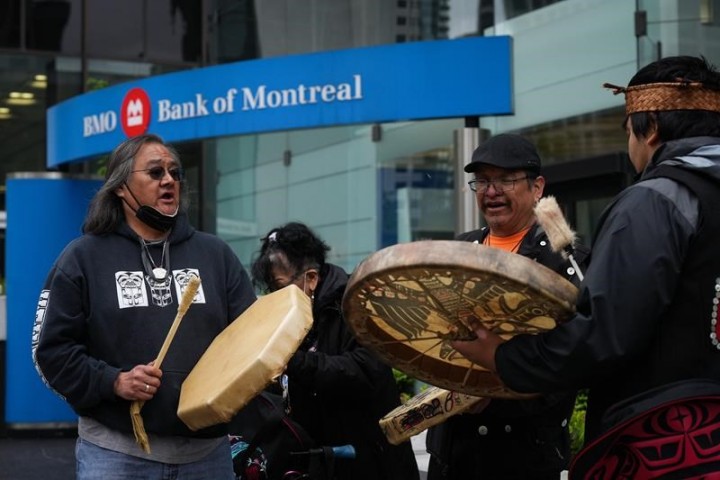VANCOUVER — Standing amid the noise of traffic and hustle of pedestrians on the same Vancouver sidewalk where he was arrested and handcuffed in December 2019, Maxwell Johnson said he finally feels at peace.
The Indigenous man and his minor granddaughter were arrested as they tried to open an account for her at the Bank of Montreal in December 2019. Police were called over suspicion they were using a fake status card.
On Thursday, Johnson announced he and his granddaughter had settled their human rights complaint with the bank. The agreement includes an undisclosed a monetary payment from BMO, a private apology, and a pledge from the financial institution to update its policies on how Indigenous status cards are handled.
Holding a grey and white eagle feather that represents healing and blessing, Johnson said his Heiltsuk First Nation culture is about forgiveness.
“We don’t hold onto anything. We don’t hold any grudges,” he said. “I just want people to educate themselves more about First Nations issues and our culture.”
He said he wants people to understand Indigenous culture, and issues faced by First Nations when they deal with the government and corporations.
“We’re people too,” he said during the news conference. “I don’t think it’s right that we have to prove who we are by carrying a status card. We’re the only race that has the status for proof that we’re First Nation people.”
A retired judge who led a disciplinary hearing against the two officers who made the arrest said in a decision released last month that they “recklessly” arrested Johnson and the girl.
Brian Neal said Johnson and his granddaughter endured a “disturbing and profoundly disrespectful series of events” as they were held and handcuffed on the busy street.
The independent review, which was ordered by the Office of the Police Complaint Commissioner, said the two officers who responded to a call from bank employees detained the pair without reasonable grounds.
Johnson and his granddaughter still have a complaint pending against the Vancouver Police Department in the B.C. Human Rights Tribunal.
When asked for comment on Thursday, Vancouver police Sgt. Steve Addison sent a statement saying the office of the complaint commissioner conducted an extensive investigation related to the matter and it respects the findings of the report.
Johnson is an artist and as part of the settlement with the Bank of Montreal, he gifted the bank an artwork that will be displayed at the downtown branch.
Prints of his work will also be put up at four other branches.
“The copper represents the treasure of our people,” he said, holding up a copy of the art piece with red and green colours.
“I used BMO colours in it. So, on the top it has the ancestral human face, and on the bottom it has the BMO logo on here.”
BMO spokesman Jeff Roman said the bank is pleased that a settlement was reached.
“This was an important step for BMO toward reconciliation and we hope that the Johnsons reach the resolution and closure they deserve,” he said in an email.
Chief Marilyn Slett of the Heiltsuk First Nation on B.C.’s central coast said the bank has undertaken remedies including updating internal policies and procedures for how Indigenous status cards are handled.
“It’s really shone a light on the treatment of Indigenous people and it puts attention and focus on that.”
They hope to see systemic changes on policies and how they work in communities, including territorial acknowledgments of where they are, not just in B.C. but across the country, she said.
The police officers who arrested the pair have been given an invitation to their community of Bella Bella to attend an apology ceremony, Slett said.
“That invitation is still extended,” she said.
“We’ve yet to hear from them. Ceremonies happen in our community because they help us in the healing journey. So, it’s really important for the Vancouver Police Department to make good on that apology and come to Bella Bella and do it in person.”
Johnson said he closed his account at the bank.
“Would you work with them if that happened to you?” he said.
“No, I couldn’t do it. I had to close it to move forward with my life. For healing too. It’s part of my healing process to do what we did today.”
This report by The Canadian Press was first published May 5, 2022.
Hina Alam, The Canadian Press
